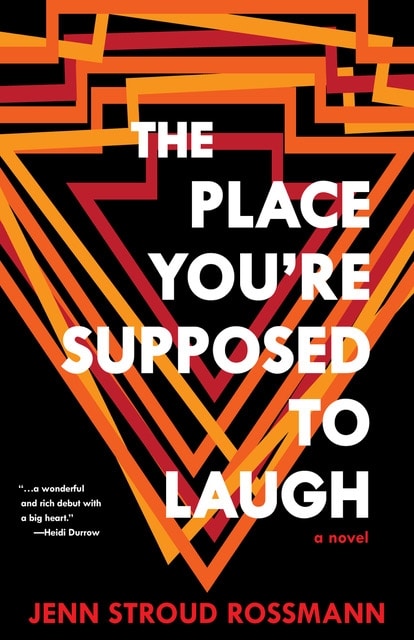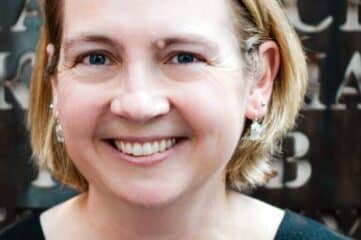
Set in Silicon Valley in the days after 9/11, The Place You’re Supposed to Laugh by Jenn Stroud Rossman (7.13 Books) is a thoughtful coming of age novel in which both teenagers and adults struggle to find their place in a changing world. Purchase a copy here, and check out the author’s website.
Jenn Stroud Rossman recently shared her thoughts on the novel, and more, with Cease, Cows.
Chuck Augello: How did you come to write this book? What was the initial inspiration for the novel?
Jenn Stroud Rossman: It started with the surreality of Silicon Valley at the turn of the century. I was in grad school at Berkeley, and many of my friends worked at startups; they had these kind of ludicrous stories about office foosball and free gourmet lunches, and I was still living on ramen and bean burritos. The two first things I wrote were about Scot MacAvoy, the dot-com mogul. I wrote from his next-door neighbor’s perspective, describing what it felt like to live in the literal shadow of this seemingly effortlessly successful guy, a tech-bro whose hoodies disguise his ambition. And then I wrote in the voice of the mogul’s wife, a woman who was part of the early startup days but has since been pushed to the sidelines as the Boy Genius drew the spotlight. Then I started thinking about the other people in this extended California family, next door to but outside the Valley gold rush, and how they were trying to live their lives in this funhouse, topsy-turvy world.
CA: Tell us about Chad Loudermilk, the novel’s central character.
JSR: Chad’s fourteen, a freshman at Palo Alto High School. His best friend just transferred out of Paly, leaving Chad acutely alone. He’s shy and awkward and thoughtful. The Loudermilks adopted him at birth. They’re white, and Chad’s black. Like a lot of fourteen-year-olds, he’s trying to figure himself out and find his people.
CA: The Place You’re Supposed to Laugh is set in Palo Alto, California in 2002, a year after the 9/11 attacks. How does that particular place and time impact the story?
JSR: There was a feeling of unease, of uncertainty, in the Bay Area after the dot–com bubble burst. After a few dizzy years of stocks and real estate prices that only went up, things very suddenly fell back to earth. People who had believed their own hype were, apparently, not infallible geniuses. Then, 9/11 caused another kind of disorientation. What it means for the novel is that Chad isn’t the only character having a kind of identity crisis. His aunt Diana is also trying to figure out how she can be both a mother and a world-class physicist.
CA: Chad’s perspective on his place in the community begins to change through his friendship with Marcus and Andre. How do they influence him?
JSR: Marcus and Andre are also fourteen and black, but they live in East Palo Alto, which is quite different from Chad’s relatively privileged Paly world—different in its ethnic makeup and in the degree to which the dot-com effervescence had lifted and transformed it. Marcus and Andre are more confident and comfortable in themselves than Chad is, and this may or may not be related to the fact that they have black families and friends. They see Chad and his family differently than Chad sees himself, and their perspective can’t help but widen Chad’s own lens on the world.
CA: Scot MacAvoy, the next door neighbor, is a marked contrast to the Loudermilks. What role does he play in the story?
JSR: He’s a foil, someone everyone else can compare themselves to. Almost everyone in the novel has an opinion about Scot. It was a conscious choice not to include his own point of view in the novel, so that he would only be seen through other’s eyes. He’s kind of the Gatsby of this neighborhood, the most successful one whose automobiles gleam and cause trouble for others, so the cul-de-sac gossips about him, and some people think he’s a callow tech-dude, other people think he’s a charismatic genius, and Chad really just likes to hang out and play Tony Hawk with him.
CA: In the novel, you write, “…danger lurked always in the darkness, in the trees, in the genes, around the next bend. But today, they had chosen joy.” It’s a lovely sentence. The need for resiliency seems critical to these characters. Was that an intentional theme of the novel?
JSR: Thank you! I did want the book to be hopeful, and for these characters to find strength in their connections, even at difficult times. I always thought of it as a comic novel, though I think it’s true that humor’s lightness kind of requires the ballast of darker moments and pain. The idea of counterpoint, in music, has melodies with different tones and rhythms playing off each other. The book begins in, and contains, plenty of darkness. I mean, to be resilient, you have to be tested. You need a heavy load to spring back from. If you’ll indulge a moment of materials science from my day job, resilience is about the ability to absorb energy and deform temporarily without incurring permanent damage or distortion. You need to get hit, stressed, and pressurized in order to demonstrate this.
CA: What were some of the biggest challenges writing this novel?
JSR: They were both logistical and artistic. It is a challenge to make time to write, especially when one has a full-time job and young children, as well as a partner and friends one enjoys spending time with. Not just a challenge of finding the time, but of overcoming the guilt of spending that time on this selfish-feeling act that pulls you away from those very beloved people. It’s a challenge to keep working on an unwieldy novel that has not yet secured an agent, publisher, or other sponsor, and to which some have responded with grave concern about its unmarketability. (I made a t-shirt for myself that says “There is much here to admire, but…”)
Another challenge was that I developed, or maybe discovered, my plot through revision. Like tear-down, build-it-again revision. So I had to throw out a lot of stuff that I had already spent tons of energy reworking and fine-tuning and shellacking until it was, you know, pretty decent. It just wasn’t essential anymore. So persisting when I didn’t know what I was doing, and then persisting when I’d been sure I did know, but was wrong—that wasn’t easy.
CA: If someone offered you the front page of The New York Times book review to praise a writer or novel you feel is overlooked, who would you write about, and why?
JSR: Honestly, I’m really struggling to think of a literary writer who gets as much attention as they deserve. I mean, Colson Whitehead won a Pulitzer, but until everybody has read John Henry Days, he’s not getting enough love. Danielle Evans is a gosh-darn genius. I have pressed copies of her collection Before You Suffocate Your Own Fool Self on a lot of people, and I am not sorry. Jean Thompson’s The Year We Left Home is a kaleidoscopic look at one American family, and I think it’s wonderful. Maile Meloy writes without excessive ornamentation, just aims her arrow at your heart and fires. I could easily write An Appreciation of Chelsey Johnson’s Stray City or Anna Solomon’s Leaving Lucy Pear.
CA: Finally, there is no shortage of ways to spend one’s time. Why do you choose to write fiction?
JSR: Well, it’s a compulsion. I am compelled to write. It’s a choice, in that I do make time for it, but it’s not strictly voluntary. During periods of my life when I have not been able to prioritize writing, the people closest to me have made it clear that this should be rectified posthaste.
I was a child who loved reading, and whose first attempts at writing were transparent mimicry of what I enjoyed. (I believe all extant copies of the adventures of Dictionary Green, Girl Detective and the sprawling Easting Game have been destroyed.) I wanted to cast a spell half as transporting and involving as those that great books cast on me.
–
Chuck Augello (Contributing Editor) lives in New Jersey with his wife, dog, two cats, and several cows that refuse to cease. His work has appeared in One Story, Juked, Hobart, SmokeLong Quarterly, and other fine places. He publishes The Daily Vonnegut and contributes interviews to The Review Review. He’s currently at work on a novel.

